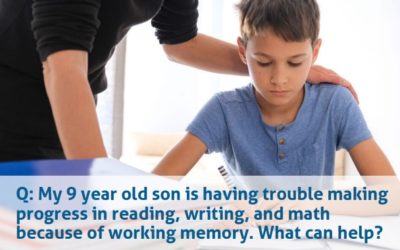It's important to be aware that although many dyslexics have natural strengths in math reasoning and scientific thinking, these strengths may not be evident during K-12 education because of challenges with symbol confusion and polysemous or multiple meaning words in...
Use of Gestures Supporting Mathematics
There's an interesting paper by Hord and colleagues that showed how a secondary math teacher supported a student with LD and math anxiety using gestures. Gestures can sometimes be used to help remember and retrieve math actions and relationships in long-term memory....
What Can Help with Working Memory Limitations?
Q: My 9 year old son is having trouble making progress in reading, writing, and Math because of working memory. What can help? Working memory is a type of memory that allows us to temporarily hold information 'in mind' to be used for other cognitive tasks. Some people...
Are There Any Group Activities That Benefit Dyslexic Students? [Premium]
Like non-dyslexic students, there can be a wide variations that exist between how students enjoy group activities. In general, extroverts love group activities, while introverts less so. But there are benefits from the selection of some activities that especially benefit dyslexic students. CREATE A POSITIVE CLASSROOM CULTURE FOR DIFFERENT LEARNERS First of all, it’s helpful to have a classroom culture that allows flexibility in learning and accepting of differences. Students can be encouraged to take a different approach while solving problems and demonstrating knowledge. A discussion about differences in learning at the beginning of the year can make students who know they learn differently, feel more welcome. Some teachers may also model their openness to solving problems or learning a different way. Offering students options […]
Learning Through Real Things: David Kelley’s Tech Box [Premium]
“Striving for perfection can get in the way during the early stages of the creative process.” — David Kelley David Kelley is recognized as one of the world’s leading design innovators. He is also dyslexic and dysgraphic. In addition to founding Stanford University Design School, David co-founded IDEO, a design company that, among other things, designed the prototype for the computer mouse that we know today. In The Art of Innovation, David’s brother Tom wrote about how David loved to make things as a little kid, and as early as he could remember, he believed in the process of starting somewhere and continually improving something until it really works. When Tom was only six, he remembers David improving how he built snowmen until […]
Dyslexic Advantage at Stow Library in MA
Last week, Brock and I gave a presentation on the Strengths of Dyslexia at the Randall Library in Stow, Massachusetts via Zoom. Tina McAndrew, director of the Randall Library, got the idea to apply for a grant from the American Libraries Association after speaking to...
Should I Help with Homework? [Premium]
“His mother had read everything to him and in medical school his wife was reading aloud all books and references…there was some opposition to his continuance in medical school on the part of the dean and one other faculty member, but the opposition subsided… After his graduation a report came from a distant medical school hospital stating that this man was the best intern they had had for some time. He passed his American boards in internal medicine and became the head of a group practice clinic in a large city…” — Lloyd Thompson, Reading Disability Should you help with homework? The answer is YES. There is a qualifier on that – you should help but only to the point that you’re helping your student […]
What to Do This Summer?
Summertime tends to be a great time for dyslexic students. The grinding schoolwork routine is gone - and school, if at all, has fewer time commitments and less time in a seat. TAKE A BREAK First, especially if your student has had a difficult school year with heavy...
The Mind Map in Your Brain [Premium]
Among professionals who work with dyslexic students, there have long been recommendations to mind map ideas. In recent basic neuroscience research, there’s been a growing understanding why. Neuroscientists have long studied how knowledge seems to work in the brain with schemas -or patterns that can form a flexible reference base that helps us understand new or existing knowledge or make decisions for how to act. But these schemas have largely been studied in a context of verbal memory – with only more recent insights into “the other schemas.” As it turns out there are a lot of other schemas and processes involving schema-making. They are non-verbal and spatial – and that is where the implications for dyslexic people may come into play. If you are […]
Virtual Learning is Here to Stay
(Guest post from Stacy Scofield from sponsor Commonwealth Learning) More than three years have passed since the World Health Organization declared COVID-19 a pandemic. And now, with little pomp and circumstance, the Public Health Emergency Declaration is over. We made...
Dyslexia and the Foreign Language Dilemma [Premium]
What to do? Many select colleges require two years of foreign language taken in high school, while telling potential applicants that they prefer four years. Sally Shaywitz of Yale University has said: “…Considering the profound impact dyslexia has on both spoken and written language acquisition, and from both an educational and a scientific perspective, it makes little to no sense to impose a foreign language requirement on students who are dyslexic and, indeed, is counterproductive to the aims of a liberal education in the 21st century.” In a previous article (Dropping Out Because of Foreign Language), we had described how a Harvard psychologist in the 1970s, Kenneth Dinklage had found that the students at risk for having to drop out of college because […]
What I Know Now About Learning a Foreign Language [Premium]
When I came across a remarkable article titled, “Dyslexia and Learning a Foreign Language: A Personal Experience,” I knew that I wanted to talk to the author. Charlann had the unique perspective of being both dyslexic and a speech language pathologist. She dodged the college level foreign language requirement by getting a bachelor’s degree in speech and theater and master’s degree in speech language pathology. “I no longer tell the truth about how long I have studied French because people cannot comprehend how I could have studied (for seven years) and…still struggle so severely with spoken and written language. I could not fluently retrieve basic structures or pronunciation patterns to communicate my thoughts in classroom discussions, so I tended to speak in sentence fragments and […]

![Math and Sciences: Symbols and Dyslexia [Premium]](https://www.dyslexicadvantage.org/wp-content/uploads/2024/03/Math-and-Sciences-1-400x250.jpg)


![Are There Any Group Activities That Benefit Dyslexic Students? [Premium]](https://www.dyslexicadvantage.org/wp-content/uploads/2024/02/Group-Classroom-Activities-400x250.jpg)
![Learning Through Real Things: David Kelley’s Tech Box [Premium]](https://www.dyslexicadvantage.org/wp-content/uploads/2024/01/Learning-Through-Real-Things-400x250.png)

![Should I Help with Homework? [Premium]](https://www.dyslexicadvantage.org/wp-content/uploads/2023/12/Should-I-help-with-homework-da-400x250.jpg)

![The Mind Map in Your Brain [Premium]](https://www.dyslexicadvantage.org/wp-content/uploads/2023/06/The-Mind-Map-in-Your-Brain-400x250.png)

![Dyslexia and the Foreign Language Dilemma [Premium]](https://www.dyslexicadvantage.org/wp-content/uploads/2023/06/Dyslexia-and-the-Foreign-Language-Dilemma-400x250.png)
![What I Know Now About Learning a Foreign Language [Premium]](https://www.dyslexicadvantage.org/wp-content/uploads/2023/05/What-I-Know-Now-About-Learning-a-Foreign-Language-Charlann-400x250.png)













